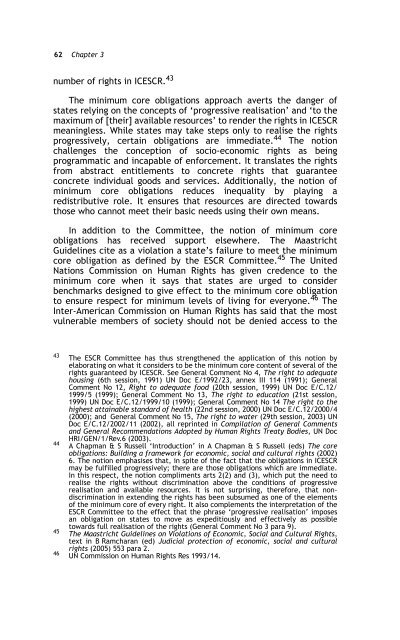LITIGATING SOCIO-ECONOMIC RIGHTS IN SOUTH AFRICA - PULP
LITIGATING SOCIO-ECONOMIC RIGHTS IN SOUTH AFRICA - PULP
LITIGATING SOCIO-ECONOMIC RIGHTS IN SOUTH AFRICA - PULP
You also want an ePaper? Increase the reach of your titles
YUMPU automatically turns print PDFs into web optimized ePapers that Google loves.
62 Chapter 3<br />
number of rights in ICESCR. 43<br />
The minimum core obligations approach averts the danger of<br />
states relying on the concepts of ‘progressive realisation’ and ‘to the<br />
maximum of [their] available resources’ to render the rights in ICESCR<br />
meaningless. While states may take steps only to realise the rights<br />
progressively, certain obligations are immediate. 44 The notion<br />
challenges the conception of socio-economic rights as being<br />
programmatic and incapable of enforcement. It translates the rights<br />
from abstract entitlements to concrete rights that guarantee<br />
concrete individual goods and services. Additionally, the notion of<br />
minimum core obligations reduces inequality by playing a<br />
redistributive role. It ensures that resources are directed towards<br />
those who cannot meet their basic needs using their own means.<br />
In addition to the Committee, the notion of minimum core<br />
obligations has received support elsewhere. The Maastricht<br />
Guidelines cite as a violation a state’s failure to meet the minimum<br />
core obligation as defined by the ESCR Committee. 45 The United<br />
Nations Commission on Human Rights has given credence to the<br />
minimum core when it says that states are urged to consider<br />
benchmarks designed to give effect to the minimum core obligation<br />
to ensure respect for minimum levels of living for everyone. 46 The<br />
Inter-American Commission on Human Rights has said that the most<br />
vulnerable members of society should not be denied access to the<br />
43<br />
The ESCR Committee has thus strengthened the application of this notion by<br />
elaborating on what it considers to be the minimum core content of several of the<br />
rights guaranteed by ICESCR. See General Comment No 4, The right to adequate<br />
housing (6th session, 1991) UN Doc E/1992/23, annex III 114 (1991); General<br />
Comment No 12, Right to adequate food (20th session, 1999) UN Doc E/C.12/<br />
1999/5 (1999); General Comment No 13, The right to education (21st session,<br />
1999) UN Doc E/C.12/1999/10 (1999); General Comment No 14 The right to the<br />
highest attainable standard of health (22nd session, 2000) UN Doc E/C.12/2000/4<br />
(2000); and General Comment No 15, The right to water (29th session, 2003) UN<br />
Doc E/C.12/2002/11 (2002), all reprinted in Compilation of General Comments<br />
and General Recommendations Adopted by Human Rights Treaty Bodies, UN Doc<br />
HRI/GEN/1/Rev.6 (2003).<br />
44 A Chapman & S Russell ‘Introduction’ in A Chapman & S Russell (eds) The core<br />
obligations: Building a framework for economic, social and cultural rights (2002)<br />
6. The notion emphasises that, in spite of the fact that the obligations in ICESCR<br />
may be fulfilled progressively; there are those obligations which are immediate.<br />
In this respect, the notion compliments arts 2(2) and (3), which put the need to<br />
realise the rights without discrimination above the conditions of progressive<br />
realisation and available resources. It is not surprising, therefore, that nondiscrimination<br />
in extending the rights has been subsumed as one of the elements<br />
of the minimum core of every right. It also complements the interpretation of the<br />
ESCR Committee to the effect that the phrase ‘progressive realisation’ imposes<br />
an obligation on states to move as expeditiously and effectively as possible<br />
towards full realisation of the rights (General Comment No 3 para 9).<br />
45 The Maastricht Guidelines on Violations of Economic, Social and Cultural Rights,<br />
text in B Ramcharan (ed) Judicial protection of economic, social and cultural<br />
rights (2005) 553 para 2.<br />
46 UN Commission on Human Rights Res 1993/14.
















